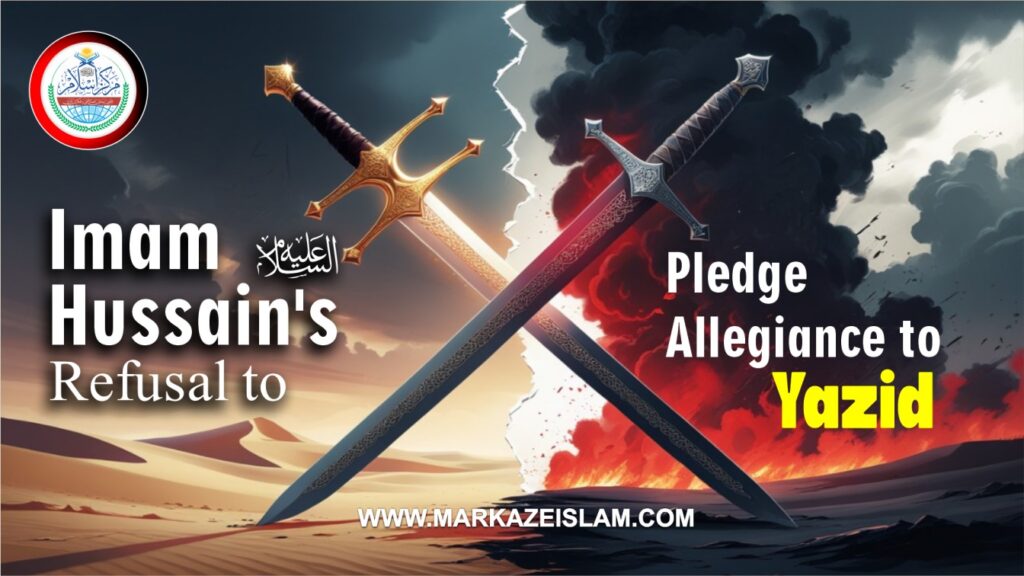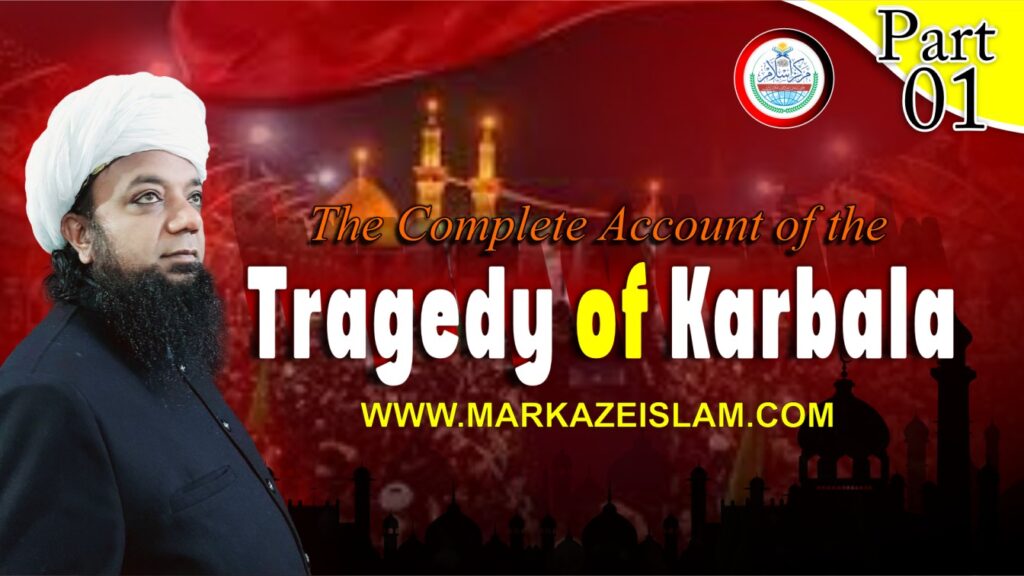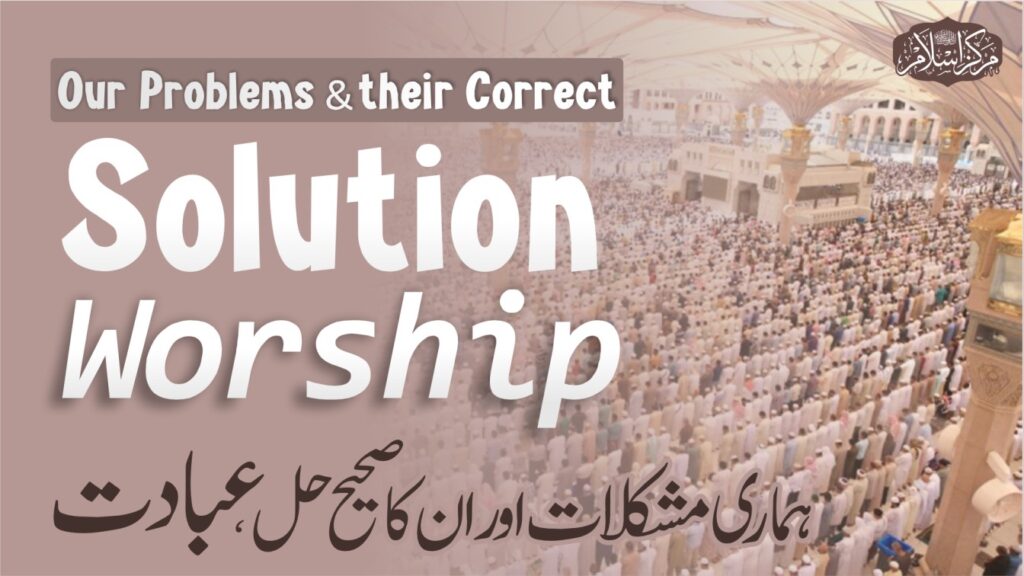There are moments in history when the line between truth and falsehood begins to blur—and slumbering consciences awaken.
Table of Contents
The battlefield where the sand burned, thirst was unbearable, numbers were few, but the truth stood tall… Karbala was such a moment. It was not merely a battle—it was a question, one that was asked of humanity then, and continues to be asked today:
“When the truth becomes clear to you, will you stand with it—or remain silent?”
Karbala teaches us not only how cruel oppression can be, but also that standing for the truth is never easy—yet this is the path most beloved to Allah. Imam Hussain (may Allah be pleased with him) did not just sacrifice his life; he gave a message to all generations to come: when truth is in front of you and falsehood is dominant, then silence is not just cowardice—it is betrayal.
This incident makes us weep, yes—but more than that, it shakes us from within.
Let us try to read Karbala—not just with our eyes, but with our conscience.
Karbala Still Lives Today
Karbala is still alive, because it is not just a historical event—it is an eternal message. It is that voice which pierces through the deaf walls of time and still stirs the conscience. To not bow before tyranny, to challenge falsehood—that is the essence of Karbala.
Sadly, we have forgotten the priceless teachings of our forefathers. Today, the difference between right and wrong is as clear as day, but we have veiled our eyes with the curtain of modernity, plugged our ears with the fingers of heedlessness, and shackled our hands with the chains of desire.
Karbala lives on, because whenever anyone stands against oppression, the message of Hussain (RA) echoes again. This struggle takes on a new form in every era.
A Glimpse into the Teachings of Our Ancestors
The teachings of our ancestors revolved around truthfulness, patience, justice, selflessness, and speaking the truth. They taught us that compromise with falsehood may bring temporary benefit—but the downfall of the conscience is an eternal loss.

Imam Hussain (RA) and his companions proved this with action in Karbala: they accepted decapitation, but never submission before oppression.
Their teachings were not just confined to books—they were evident in their character, speech, and deeds. That very light still has the power to dispel darkness… if we choose to embrace it.
The Age of Modernity and the Muslim Response
Our predecessors did not treat modernity as an enemy, but as a means of knowledge and wisdom. Muslim scientists like Al-Zahrawi laid down the principles of surgery based on cleanliness, reasoning, experimentation, and compassion—
While in that same era, the West was drowned in ignorance, linking diseases to jinns and spirits, and surgery was performed by barbers or butchers—men who neither cared for pain nor held life sacred.
Muslims advanced medical science on rational foundations and treated it as a moral duty.
This is the lesson for today’s Muslims: rather than fearing progress and innovation, embrace it through the light of our ancestors—
But with knowledge governed by faith, research grounded in ethics, and innovation guided by Shari’ah. This is the path to restoring our lost glory.
Yazid’s Rule and Imam Hussain’s (RA) Refusal
Yazid’s Reign:
After the passing of Hazrat Muawiyah (RA) in 60 AH, his son Yazid bin Muawiyah took over the caliphate. This transfer of leadership turned the Islamic caliphate into a political inheritance—completely against the Islamic system of governance.

Yazid’s personality and lifestyle were in clear contradiction to Islamic teachings. He was involved in luxury, drinking, music, tyranny, and obscenity—testified to by many historians of his time.
To rise against him was a religious duty for every believer—but because Yazid held political power, many chose to remain silent…
When Yazid assumed power, he sent letters to all governors demanding allegiance.
Yazid’s Letter to the Governor of Madinah:
He wrote a letter to Waleed bin Utbah bin Abu Sufyan, the governor of Madinah, saying:
“The Caliph of the earth, Muawiyah bin Abu Sufyan (RA), has departed this transient world, and I have now been appointed as his successor. All affairs of the state lie within my authority. You must obtain allegiance from the people of Madinah—especially from Hussain ibn Ali (RA), Abdullah ibn Umar (RA), Abdur Rahman ibn Abu Bakr (RA), and others. If they refuse and do not comply, summon them immediately and send their severed heads to me.”
At that time, Imam Hussain (RA) spent much of his time in worship at the blessed tomb of his grandfather, the Holy Prophet Muhammad ﷺ.
Imam Hussain’s (RA) Refusal
Waleed summoned Imam Hussain (RA), but the Imam refused to give allegiance to Yazid. His refusal was not against a man—but against an entire corrupt system. Imam Hussain (RA) declared:
“I cannot pledge allegiance to a sinner and transgressor like Yazid.”
This refusal laid the foundation for Karbala.
The Prophetic Dream and the Desire for Martyrdom
Imam Hussain (RA) again visited the tomb of his grandfather and saw the Holy Prophet ﷺ in a dream. The Prophet ﷺ had Imam Hussain’s head in his lap and, with tearful eyes, said:
“O piece of my heart, O coolness of my eyes! Your enemies are ready to harm you. Soon, you shall be alone and helpless in the plain of Karbala. You shall be martyred at the hands of oppressors. My son, these people shall be deprived of my intercession on the Day of Judgment.”
Upon seeing this dream, the desire for martyrdom overtook Imam Hussain (RA), and he firmly submitted to the Divine will, declaring:
“Rida bi’l-Qada” — “I am content with Allah’s decree.”
The Content of Yazid’s Letter
As recorded in Tarikh al-Tabari, Yazid’s letter stated:
“Muawiyah (RA), a devoted servant of God, has passed away. Now I desire allegiance from everyone. People must hasten to pledge allegiance without delay. Though Muawiyah tried to gain allegiance from four individuals, they refused. Now, by whatever means necessary, allegiance must be taken from them.”
When Waleed received the letter, he consulted Marwan. Marwan advised:
“O Waleed! Do not let go of obedience to Ameer al-Mu’minin Yazid. Call these four individuals and present the command. If they agree, good. If not, kill them and send their heads.”
Waleed replied:
“SubhanAllah! O Marwan, do not speak this way about the sons of Fatimah (RA), Abu Bakr (RA), Umar (RA), and Zubayr (RA). It is not appropriate to destroy the images of such noble personalities.”
Eventually, Waleed summoned Imam Hussain (RA), who, already aware of Yazid’s intentions, took fifty armed men with him and instructed them:
“Stay at the door and listen carefully. If you hear my voice raised, come in at once.”
Waleed stood in respect when the Imam entered and read Yazid’s letter. Imam Hussain (RA) replied:
“This letter is addressed to four men. Call them all so we can pledge allegiance together.”
Waleed agreed. As the Imam rose to leave, Marwan exclaimed:
“O Waleed! Kill the son of Hussain right here and now—do not give him a chance to leave.”
Imam Hussain (RA) turned and said:
“O Marwan! You cannot kill me. If you have the courage and manhood to try, then Bismillah, here I am. Perhaps you have not yet seen the gleam of Banu Hashim’s sword!”
That same night, he left Madinah with Abdullah ibn Zubayr (RA) for Makkah.
But Imam Hussain (RA)—the grandson of the Prophet ﷺ, son of Ali (RA) and Fatimah (RA), the light of Ahl al-Bayt—refused to accept falsehood. His refusal was not merely a rejection of one man’s rule, but a rebellion against a corrupt system and a declaration of safeguarding the true spirit of Islam.
Imam Hussain (RA) had said:
“I will never pledge allegiance to a sinful and immoral man like Yazid.”
This refusal became the very foundation of Karbala—where truth and falsehood would clash.
Journey to Makkah and Letters from Kufa
After refusing to pledge allegiance, Imam Hussain (RA) departed for Makkah on the 28th of Rajab, accompanied by Abdullah ibn Zubayr (RA). Upon reaching Makkah, he received numerous letters from the people of Kufa, pleading with him to come to them.
In response, Imam Hussain (RA) sent his cousin, Hazrat Muslim ibn Aqeel (RA), to assess the situation in Kufa.
To Be Continued Soon…
Karbala was not just a battle—it is a mirror for every generation. Imam Hussain’s (RA) message lives on. Whenever anyone rises against oppression, the name of Hussain (RA) lives again.
We must not only remember Karbala—we must draw lessons from it. We must cultivate the courage to stand for truth, for this is the message of Hussain (RA).
This informative and spiritual blog is the work of Hazrat Pir Abu Nauman Rizvi Saifi Sahib, written with sincerity and devotion to guide the Muslim Ummah in matters of faith and spirituality.
If you found this article insightful and beneficial, please share your thoughts and pass it on to your friends, family, and others—so that this message may reach as many hearts as possible.
If you wish this blog series to continue, do let us know in the comment box below




